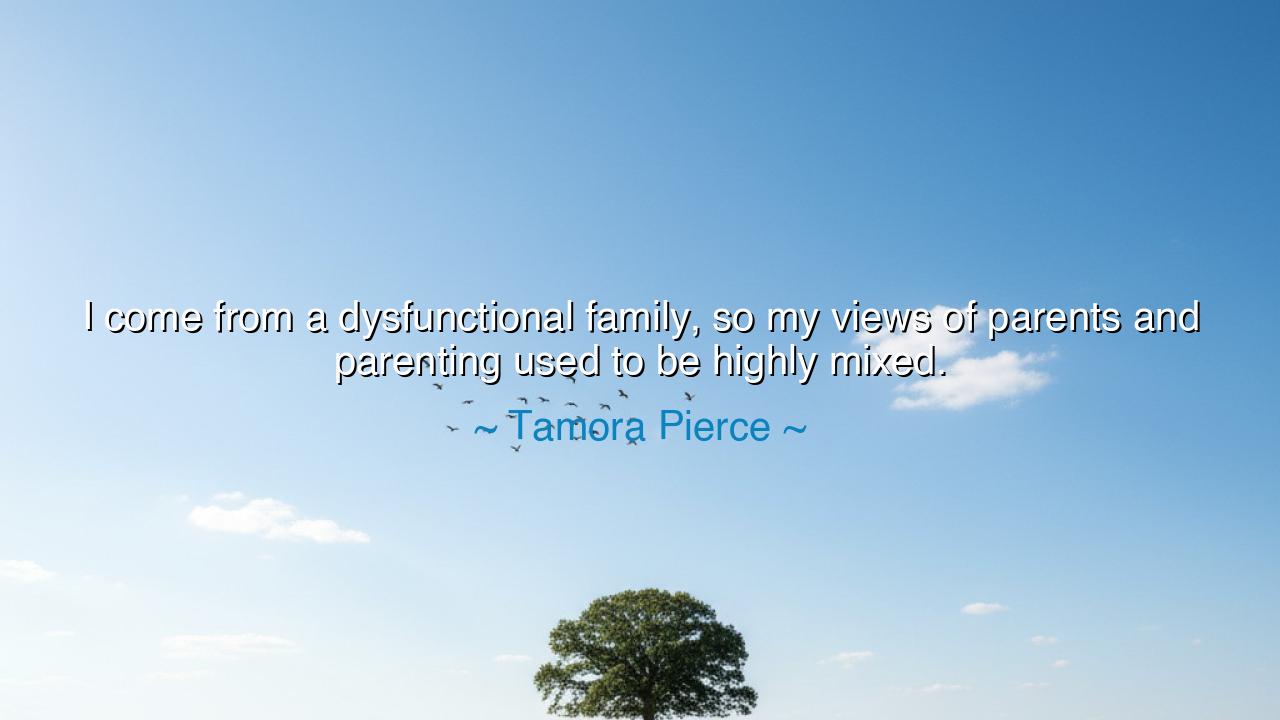
I come from a dysfunctional family, so my views of parents and
I come from a dysfunctional family, so my views of parents and parenting used to be highly mixed.






In the words of Tamora Pierce, there is both confession and wisdom: “I come from a dysfunctional family, so my views of parents and parenting used to be highly mixed.” These words pierce the heart, for they reveal the inheritance of brokenness that many bear in silence. A family, which should be a sanctuary, may instead become a battlefield. And from such soil, the child learns lessons both bitter and true—lessons that shape how they see themselves, their elders, and the very meaning of love and care.
The ancients understood that family is the first kingdom, the first school, the first temple. When the kingdom is divided, when the school teaches chaos, when the temple is defiled, the child carries away fragments rather than foundations. Pierce acknowledges this reality: that her earliest experiences of parenting left her with confusion, mistrust, and doubt. Yet she also speaks of growth, for the very act of recognizing dysfunction is itself the beginning of wisdom. To see the cracks clearly is to be free to choose a different way.
History gives us a clear mirror of this truth. Consider the childhood of Eleanor Roosevelt. Born into a family marked by distance, alcoholism, and emotional coldness, she carried wounds of neglect. Yet those very wounds drove her to create a life of empathy, service, and courage. She transformed the bitterness of her upbringing into a fountain of compassion for the oppressed and forgotten. Like Pierce, she began with “highly mixed” views of parenting, but from that turmoil arose clarity, resilience, and strength. The past did not imprison her—it equipped her.
Pierce’s words also remind us that parents are not gods but humans, often shaped by their own wounds. A dysfunctional family is rarely the product of deliberate cruelty alone, but often the echo of generations passing down broken patterns. To acknowledge dysfunction is not only to critique, but also to understand: that behind harshness may be fear, behind neglect may be wounds unhealed. This recognition does not excuse the harm, but it gives the child a chance to break the cycle, to choose healing over repetition.
The meaning, then, is both humbling and empowering. To come from a dysfunctional family is not to be doomed, but to be given the gift of perspective. The “mixed views” that Pierce carried are the seeds of discernment—the ability to see what must be carried forward and what must be left behind. Every person raised in brokenness has the power to transform their story: to reject bitterness, to embrace forgiveness, and to build homes of love where once there was fear.
The lesson for us is clear. First, let us not hide from the truth of our beginnings. To name dysfunction is to disarm it. Second, let us choose consciously which legacies we will carry and which we will lay down. A child of harshness may choose gentleness; a child of neglect may choose presence. Third, let us remember that healing is possible, and that by shaping our own parenting differently, we become ancestors of hope rather than despair.
O seekers of wisdom, remember this: the pain of the past does not decide the shape of the future. From broken families have risen healers, leaders, and visionaries who dared to rewrite the story. If you too carry “mixed views,” take heart—they are proof that you see clearly. Use that clarity not to dwell in sorrow, but to forge a better path.
Thus, Tamora Pierce’s words are not merely lament, but a torch passed forward. She shows us that out of dysfunction can come wisdom, and out of confusion can come resolve. Let us, then, honor our past without being chained to it, and let us create families where the cycles of pain are broken, and where love—steady, patient, and whole—may finally take root.






AAdministratorAdministrator
Welcome, honored guests. Please leave a comment, we will respond soon